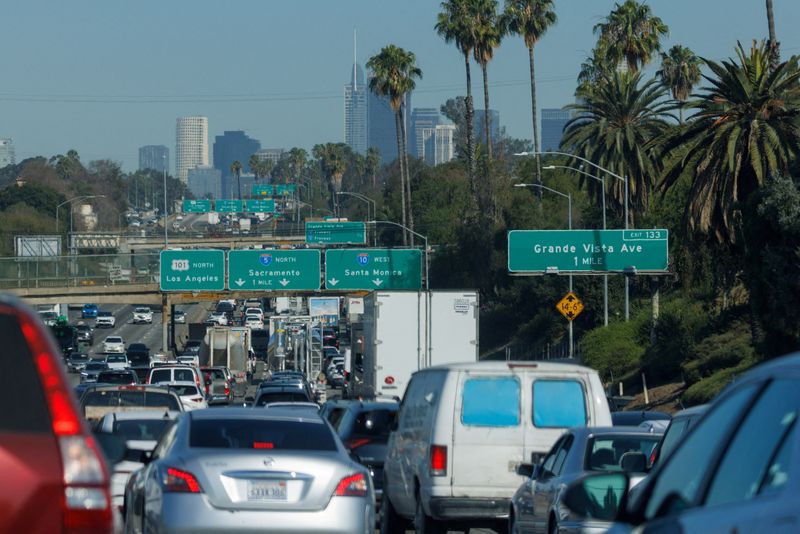(Reuters) -California regulators voted on Friday to toughen a coverage aimed toward boosting low-carbon fuels to slash greenhouse fuel emissions from the transportation sector and meet state local weather change targets, regardless of criticism it might enhance retail gasoline costs.
The 14-member California Air Sources Board voted 12 to 2 to approve modifications to the state’s influential Low Carbon Gasoline Customary (LCFS). The vote adopted practically eight hours of testimony from supporters and opponents of this system, in addition to a prolonged debate amongst board members.
A number of members mentioned the modifications had been important to preserving Democrat-led California’s local weather management following Donald Trump’s presidential victory. Trump, a Republican, has pledged to rescind California’s capability to set its personal car emission guidelines, as he did throughout his first time period as U.S. president.
“The world is watching California to see if we will maintain leadership or fracture under internal pressure for perfectionism,” state Senator Henry Stern (AS:), a non-voting board member, mentioned in an announcement learn on the assembly by fellow board member Hector De La Torre.
“California has a long history of enacting visionary and affordable climate policies that are durable enough to endure major shifts in national politics like we just witnessed.”
The amendments to the LCFS, which has been in place since 2011, would require a deeper discount within the carbon depth of transportation fuels by 2030 to ensure that gasoline producers to earn this system’s tradable credit.
Transportation accounts for about 50% of the state’s greenhouse fuel emissions.
Whereas biofuel producers and a few state local weather advocates backed the modifications, critics together with oil corporations and shopper advocates mentioned the change would enhance gasoline prices for Californians. Environmental teams additionally argued that the coverage would lengthen the manufacturing of oil and fuel and prioritize fuels created from meals crops and huge dairy operations as an alternative of encouraging a transition to electrical autos.
The LCFS requires gasoline makers to purchase tradable credit if their merchandise generate extra carbon emissions than a baseline set by regulators on the air sources board. Refiners that produce low-carbon fuels and gases can generate the credit to promote.
The coverage set off a increase in renewable diesel and biogas manufacturing in recent times that has despatched credit score costs all the way down to round $70 from above $200 in 2020. The coverage revisions are supposed to prop up credit score costs and encourage extra low-carbon gasoline manufacturing.
On account of the board’s vote, the LCFS would require a 30% discount within the carbon depth of transportation fuels by 2030, up from 20%. The revisions will add a 90% carbon depth discount aim by 2045.
Builders of tasks that produce renewable fuels from natural waste supported the measures.
Opponents voiced concern, nevertheless, in regards to the potential for increased gasoline costs.

In an evaluation launched final yr, the board mentioned the modifications might enhance the worth of gasoline by 37 cents a gallon, on common, from 2024 by way of 2030. However the board has since mentioned fashions can’t precisely predict future gasoline costs.
The board’s inner environmental justice advisory committee had urged it to reject the revisions, citing an exemption for jet gasoline producers and huge subsidies for dairy methane tasks, amongst different issues.




